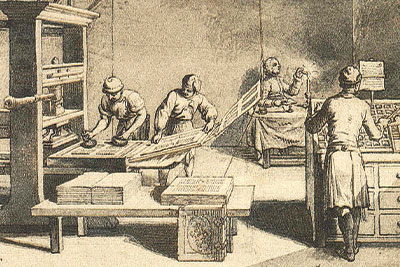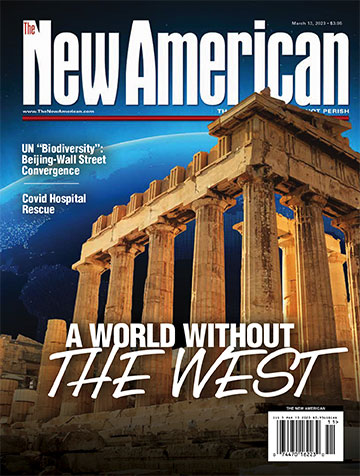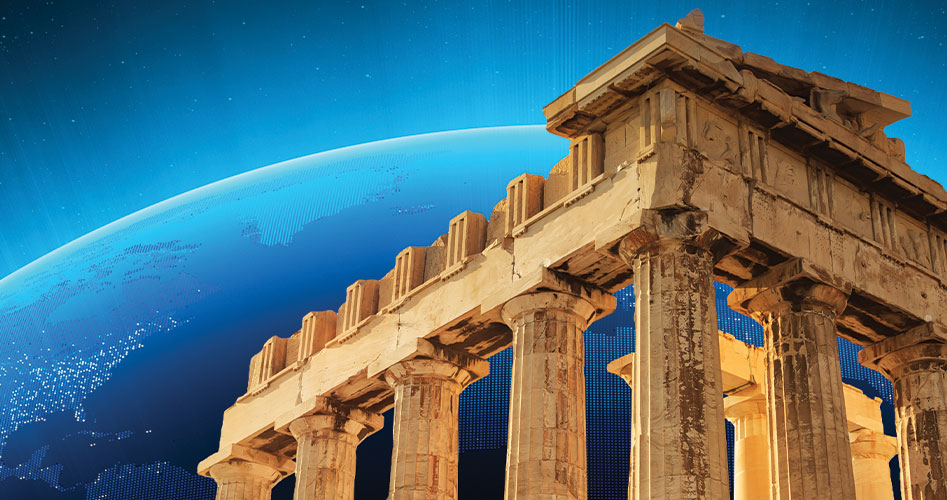A World Without the West
Coming out of his sociology class, Jayson was stoked. Wading into current events, his instructor, Professor Berger, had mentioned that not only did Joe Biden offer developing nations “climate reparations” at the recent COP27 climate summit, but that their university had agreed to drop its Western Civ. requirement. “Finally,” he thought, “progress!” as he got into his car to make the 50-minute trip to his girlfriend’s house to meet her parents. Jayson was still mad, though. “I hate this @#$^&*! Western society,” he said to himself, “with its structural racism, patriarchal and heteronormative oppression — and Christian fundies. We’ve gotta end it!” Yet he was risking ending himself. Fiddling with his electronics while trying to play some music and, again, quite exercised, he didn’t notice he was taking the approaching curve a bit too fast and that, after the day’s rains, some mud was slickening the road. Fear coursed through him as he lost control of the car — and spun down into a gully.
Jayson woke up, confused. He was in a forest and could tell it was morning. He had some scrapes and bruises and some dried blood on his head. “Oh, yeah, I was in an accident. But where’s my car?” he wondered, looking about. “I musta been here for a while because ... yeah, that’s right, it was early evening when I left class. I’ve gotta find help.” Jayson commenced walking.
“Where’s the road?” he thought. “I just skidded down that hill — and, wait, where’s the hill?” He was perturbed, to say the least, and the apprehension only grew as he walked, and walked and walked, and found nothing but forest. But then his heart leapt; he heard some voices. Quickly walking toward the sound, he came to a clearing — and then he heard a thud. Turning left, he saw an arrow in a tree mere feet away. Jayson then instinctively looked toward the direction it came from. “Huh? What?! Those look like ... ‘native Americans!’” Startled and confused, Jayson hesitated for a moment even as these frightening-looking people were running toward him, closing fast. He reacted and turned and bolted just soon enough so that another arrow narrowly missed its mark. He ran desperately, as fast as he could. Having done track in high school, Jayson was still fleet of foot; nonetheless, he could sense his pursuers’ menacing proximity. Coming to a small valley in the forest, he proceeded down its slope without breaking stride, only to learn it quickly steepened. Panicked and trying to turn, he slipped on the muddy ground and slid and tumbled and skidded. Screaming, rolling end over end, he splashed. It was cold river water, just sufficiently deep to break his fall enough to preclude broken bones — and fast moving. The rapids were a perilous blessing: They carried him swiftly away from the human menace, depositing him several hundred feet downstream.
Getting off track: It’s easy being idealistic when you don’t have to live with your ideals. By way of fictional illustration, the author describes a young man who accepted the spin put on Western history until he spun out in his car and got mugged by an alternate reality. It made the difference between being woke — and waking up to Truth. (Easy_Asa/ iStock / Getty Images Plus)

Scraped and bruised some more, Jayson pulled himself ashore. Fleeing farther into the forest with whatever strength he could still muster, he didn’t stop until his breath gave out. Collapsing, he caught his wind, sat up, and wept. “Jay,” he heard a voice say. Startled, he looked up. He stared for some seconds, incredulous. “Wha ... Gramps?” he said. “Yes, Jay, it’s me.” “But ... but how is this possible,” replied Jayson, “y-y-you died when I was six. Am I also…?” “Dead?” said Grandpa Phil. “No. But neither am I, actually, though that’s a different matter.” “But how is this possible?!” asked Jayson. “What’s going on here?!” “I’m bein’ allowed to visit with you for a spell,” Grandpa answered. “As for the other ‘What’s going on?’ well, son, you got your wish.” “My wish?” queried Jayson. “Yup,” Grandpa said. “You wanted Western civilization gone. And it is.” Putting his head in his hands, Jayson whined, “I musta hit my head; I need to get to a hospital.” “Good luck with that,” Jay; “there are no hospitals — Western culture wasn’t around to create them. There are no ambulances, no buildings, no computers, planes, scientists or doctors or anything you know. Those Indians back there, they have a medicine man, but he can’t help.” “You mean those native Americans,” said Jayson. Rolling his eyes, Grandpa replied, “Yeah, well, those ‘native Americans’ ’ll kill ya just like the Indians will! Oh, don’t get me wrong, there are more peaceable tribes — but, kid, this ain’t one of ’em. They’re still lookin’ for ya, too. “This has to be a dream,” Jayson moaned. “It’s more like a nightmare, Jay. But it’s a real-life one.” “I have to get to my girlfriend’s house,” muttered Jayson, not thinking clearly. “Marisol, that’s her name,” said Grandpa. “Her parents would’ve come from what we called ‘Mexico,’ right? She doesn’t exist. Human sacrifice took one of her ancestors about 80 years ago; the Aztecs got ’em, I think.” “Human sacrifice?!” exclaimed Jayson. “How?!” “It ended her line because Western civilization wasn’t around to end it,” explained Grandpa. “But everyone you ever knew never was, Jay. Pestilence, famine, warfare, childhood diseases, infant mortality, women dying during childbirth; all these things and more claimed most of ’em because Western glories weren’t around to create civilization. Even your existence, Jay, it’s, well, provisional.” “Provisional?” Jayson repeated. “Jay, you can’t exist, either. Oh, your ancestors avoided the, let’s say, Four Horsemen of the Apocalypse; survivors, they are. But because everything was different, because the Americas were never settled, your great-grandparents never met.” No sooner had Grandpa finished this line than voices could again be heard in the distance. “It’s your Indian ‘friends,’” said Grandpa. Jayson looked at him, wide-eyed. “Why are they so hostile, Gramps? I didn’t do anything!” “Son, you’re an alien to them, something to be destroyed. Did you expect belief in the brotherhood of all men without having the faith that instills that truth? Did you expect Christian norms without Christianity, which the West, pre-your-wish, had brought to these shores? But don’t worry, Jay, I can take you outta here.”
There was a blur, and the next thing Jayson knew he and Grandpa were elsewhere in the forest. The voices could not be heard. “This can’t be real,” Jayson again insisted. “But I feel hot.” Smiling slightly, Grandpa said, “You’re safe now. You just picked up a bug. But, look, Jay, you’re exhausted. Sleep, my boy, sleep — and wake up to reality.” With that, the old man disappeared. Jayson stared for several moments, and then broke down weeping once more. He soon drifted off.
Jayson looked up and saw the white ceiling. He realized he was in a hospital bed, and his parents were there. “Ah, you’re awake,” his father said, happily. “How do you feel, Jay?” “Sorta weak, but okay,” replied Jayson after some seconds. “What happened?” “You were in an accident and delirious when brought in,” Dad answered. But that’s all we can tell you ’cause it’s the darndest thing: You were found in the middle of a national forest, 90 miles from your car. You couldn’t have made it that far on foot, and the place was so remote you had to be airlifted out. It’s just dumb luck you were found, really; a hiker saw you. A college professor, he was — teaches Western studies, I think.” “We’re so relieved you’re safe, my darling,” Jay’s mother chimed in. “I’m so happy you’re back in civilization!” Jayson was pensive for a moment. “So am I, Ma,” he replied. “So am I.”
The young man in this story got mugged, one might say, by an alternate reality. Yet in reality, there are millions of Jaysons in the Occident today. Given this, and that the “most effective way to destroy people is to deny and obliterate their own understanding of their history,” to quote 1984 author George Orwell, Westerners should perhaps fear for their civilization. Just consider, for example, a recent YouGov poll finding that 42 percent of young Britons believe we should “teach students that Britain was founded on racism and remains structurally racist today,” as the researchers put it. Never mind that the U.K.’s origination dates back to a time when there was, applying our modern conception of race, only one “race” in the land — one made up of people who didn’t even share that modern conception of race. Then there were the comments made in November 2022 by FIFA (soccer world body) president Gianni Infantino on the eve of the World Cup. Upon being asked at a news conference about the human-rights record of the event’s host country, Qatar, he hissed, “What we Europeans have been doing for the last 3,000 years, we should be apologizing for the next 3,000 years before starting to give moral lessons.” The infantility of making this statement in a Muslim country was apparently lost on Infantino. But approximately 20 percent of those three millennia comprised the Islamic Expansion Period, during which the West was struggling for survival, imperiled by Muslim forces that at one point would get within 125 miles of Paris (732 A.D., the Battle of Poitiers). Note, however, what Europeans “had been doing” for close to 100 percent of that 3,000 years: creating a civilization that would literally transform the planet.
This is especially important to bear in mind now that Joe Biden, along with leaders of other wealthy, industrialized nations, agreed to the aforementioned “climate reparations.” This idea “came out of the 2015 Paris Accord,” wrote Fox Business host Larry Kudlow on November 21, 2022, yet “it was never implemented in the U.S. because the Republican Congress wouldn’t do it during the Obama years.” So some good news is that with the GOP having assumed control of the House on January 3, they’ll perhaps block the scheme again. Yet none of this addresses the moral matter: Is the West really responsible for damaging the developing world by having spewn copious amounts of CO2 into the air for more than a century (and for other reasons)? Or is this just a bit like fuming at God when you get a headache because He gave you a head?

A voice for the masses: Considered by some sources the most significant invention of the second millennium, Johannes Gutenberg’s innovations in movable-type printing — along with other Western creations such as radio, television, and the internet — birthed a transformative information revolution. If knowledge really is power, then the West empowered man incalculably. (Daniel Nikolaus Chodowiecki)
The reality is that there is a small problem with, as so often has been done, mounting “a defense of Western civilization”: It sounds defensive. We should rather mount an offense for Western civilization, understanding a simple truth: It is the greatest civilization ever to grace this planet, man’s crowning achievement. It has transformed the world in myriad ways, wholly positive on balance, and all mankind should drop to their knees and thank God for it (especially since its existence is partially attributable to His grace and divine revelation). What’s more, the greatest harm it’s doing — e.g., spreading sexual devolutionary rot throughout the world — results from its own rebellion against its own Western tradition. Of course, there’s nothing authentically “Western” about this; the people advancing such agendas are avowedly anti-Western and seek the civilization’s demise.
Given current events, a good place to launch our offensive is against the push for “climate reparations.” British writer and ex-politician Dan Hannan did good work in this regard on November 21, making numerous relevant points in his piece “Demands for ‘climate reparations’ are laughable.” First he writes that the climate
claims are rooted in indignation rather than science. For example, Pakistan, which leads the G-77 group of poorer states and is leading the campaign, claims that its floods are a product of climate change. But might Pakistan look a little closer to home? Although Europe and North America have seen significant reforestation over the past half-century, Pakistan has gone in the other direction. A third of its landmass was forest when it became independent in 1947. Now, it is one-twentieth, and the rains run straight off the mountains into silted-up reservoirs that then overflow, whence the floods.
But never mind all that — blame the colonialists, eh?
This is much as with California, now perhaps our least “Western” state. Its recent forest fires were blamed on global warming, yet the real culprit was also closer to home: Its shoddy forest management. Hannan is too charitable, however. In reality, Pakistan’s claims are rooted in greed, cynicism, and opportunism.
This dishonesty is also reflected in the attack on industrialization, which Hannan calls “the miracle that released our species from 10,000 years of backbreaking labor.” “In truth, as well as giving us longer, healthier, and freer lives, the wealth released over the past 200 years of specialization and exchange is cleaning up the environment,” he states. “The air and water are purer in London than in Lahore [Pakistan] because GDP is higher. For the same reason, natural disasters have become far less lethal. The 1950 floods in Pakistan killed many more people than this year’s [2022], because they hit a poorer country.”

Powering the world: The internal-combustion engine is just one of the countless Western marvels that took the world from penury and privation to prosperity. And while many lament these wonders’ existence, as they speak of our allegedly “unsustainable” lifestyles, they all want to sustain that lifestyle for themselves personally. (AP Images)
This reality warrants elaboration. Per Hannan’s earlier point, the United States does in fact currently have more forested land than it did 100 years ago (and our water and air are cleaner now than 60 years back). As I explained in “Why the Greentopians Would Destroy the Earth” (The New American, January 20, 2020), there are two prerequisites for a healthy environment: freedom, in the sense of being able to choose your leaders and hold them accountable, and prosperity. The former is required because autocratic leaders, insulated from consequences, will rape the natural world to achieve their ends (especially a problem since an inordinate number of despots are sociopaths, psychopaths, or narcissists). As for prosperity, its necessity is explained well via an old Chinese proverb: “When there is food on the table, there are many problems; when there is no food on the table, there is only one problem” — e.g., if poor, hungry, desperate people have a choice between clear-cutting jungle and their family starving, you know what their decision will be. But there’s a simpler way of framing the above: To have healthy environments, nations such as Pakistan must become quintessentially Western. Far from the claim that to save the Earth they mustn’t “become like us,” the truth is that to “save” (if we’re to talk about ourselves as if we are saviors) the Earth, they must become like us, industrialized and prosperous.
Hannan next addressed another anti-Western fallacy, writing that
there is the related assumption that rich countries owe their wealth to exploitation, that one nation’s gain must mean another’s loss. This is palpable nonsense. The enrichment of a country, other things being equal, is good news for all of its trading partners. And countries get wealthy not by conquering others (a process that is always expensive) but by pursuing the right policies, such as secure property rights, low taxes, independent courts, light regulations, and free trade. If you tax successful countries to pay unsuccessful ones, you will end up with fewer of the former and more of the latter.
As to Hannan’s first point above, note that China wouldn’t enjoy its success and burgeoning power without having wealthy trading partners such as the United States and European Union to buy its goods. So a rising tide really does lift all boats — except the leaky ones.
Speaking of which, one exploitation argument used to explain leaky-nation status is that the West stripped Third World countries’ wealth via colonization. In reality, however, there’s no correlation whatsoever between having been a colony and poverty. As late economics professor Walter E. Williams wrote in “Poverty Is Easy to Explain” in 2011, it
turns out that countries like the United States, Canada, Australia, and New Zealand were colonies; yet they are among the world’s richest countries. Hong Kong was a colony of Great Britain until 1997, when China regained sovereignty, but it managed to become the second richest political jurisdiction in the Far East. On the other hand, Ethiopia, Liberia, Tibet, and Nepal were never colonies, or were so for only a few years, and they rank among the world’s poorest and most backward countries.
Despite the many justified criticisms of colonialism and, I might add, multinationals, both served as a means of transferring Western technology and institutions, bringing backward peoples into greater contact with a more-developed Western world. A tragic fact is that many African countries have suffered significant decline since independence. In many of those countries the average citizen can boast that he ate more regularly and enjoyed greater human-rights protections under colonial rule. The colonial powers never perpetrated the unspeakable human rights abuses, including genocide, that we have seen in post-independence Burundi, Uganda, Zimbabwe, Sudan, Central African [Republic], Somalia, and elsewhere.
Note, too, that all or virtually all nations were “colonies” at one time. In fact, colonizer extraordinaire Britain was itself conquered by the Romans in 43 A.D. It’s also the case that Rome’s “victims” had the same complaints, though in different words, made in recently colonized nations’ names: Their “oppressor” was imposing values, denuding their cultural landscape, and mercenarily exploiting them. Yet did any of these vanquished peoples really lose “freedom”? Neither first millennium Europeans nor 18th- and 19th-century “Third Worlders” (the term didn’t exist at the time) had representative government; they were ruled by kings or tribal chieftains. Thus, conquest for them sometimes just meant getting different masters, who, note, might be well in the background because they often let the leaders they subdued continue in their former roles.
This isn’t to rubber-stamp colonization, only to add perspective: Before lamenting the past, be sure to count a situation’s blessings, not just its curses. For example, Rome introduced technology, culture, a system of law — and, most significantly, Christianity — which transformed Europe. Europeans would later do likewise in the Third World, which, owing to Western influence, do note, would finally enjoy representative government. In fact, insofar as this is suggestive of freedom, one could say that the West moved these lands from autocracy to liberty. Of course, this doesn’t mean nothing was lost.
What this was, American Thinker’s Andrea Widburg concisely related December 24:
As Steven Pinker explains in a book I never tire of citing, The Better Angels of Our Nature: Why Violence Has Declined, all Stone Age societies (that is, societies without wheels, with minimal tools, and without stable habitation [such as found in the precolonial Americas and Africa]) have developed in the same way: They form tribes that engage in constant warfare with surrounding tribes.
“This warfare wasn’t fought with standing armies in nice uniforms,” Widburg continued. “Instead, it took the form of endless raids that saw the successful tribe destroy the unlucky tribe: It would kill the men and older boys and kidnap the women and children.” In fact, contrary to the anti-Western “Noble Savage” myth, “primitive” societies well deserved the term. They were rife with brutality — often including human sacrifice and cannibalism — vanquished so long before in the West that people didn’t even remember it. Westerners would end this savagery in colonized lands, too (e.g., forbidding India’s sati, or widow burning), and plant the cross.
Economics professor Thomas Sowell summed up the colonizer/incidental-benefactor phenomenon well in his 1998 book Conquests and Cultures: An International History. Where “a technologically or organizationally more advanced people have conquered a people lagging behind in these respects [as with Western colonization], then conquest — like migration — has been a way of spreading the existing human capital of mankind and promoting the development of more human capital among more peoples,” he pointed out. Yet not all conquest is created equal. Sowell continued:
But, where conquerors are clearly less economically or intellectually developed than those they conquer — a common situation for centuries, during which ancient civilizations in the Middle East were prey to mounted nomadic warriors from the steppes of Central Asia, then conquest has not promoted the spread of human capital but instead has destroyed much of it where it existed and prevented civilization from spreading to militarily vulnerable areas.
In other words, if you had to pick colonizers, Westerners were the best this fallen world had to offer.
Moreover, and as Hannan touched on, colonization was actually more financially costly to the colonizers than the colonized. “Overall, Britain received less than seven percent of its imports from Africa, less than from any other continent including thinly populated Australia,” Sowell also writes in Conquests and Cultures. “Nor were African colonies usually important sources of profit to European investors or of revenue to European governments. German colonies, for example, in the years leading up to WWI, consistently absorbed expenditures greatly exceeding the revenues raised within the colonies, with taxpayers in Germany having to make up the difference.” Sowell further explained that while various special interests encouraged colonization, “officials responsible for the public treasury were often opposed, viewing the matter in terms of financial costs and gains. In special cases such as the Congo or South Africa, with their valuable mineral resources, the conquest might repay its costs. But these were exceptions rather than the rule.”
Information revolution: A very Western invention, the computer dates back to the 19th century. In the late 1930s and early ’40s, the modern era of digital computers would begin in the United States, Germany, and Britain, with the personal computer coming a few decades later. It’s a revolution whose impact is perhaps still not fully understood. (U.S. Army)

So can it be said that the Third World is better “for having known the West”? Without question. As commentator Ben Shapiro explained in 2019 in the National Review piece “How the West Changed the World for the Better”:
Thanks to the West, billions of human beings no longer suffer in abject poverty; thanks to the West, democracy is seen as both the moral and the practical default position for aspiring governments; thanks to the West, individualism has been able to gain ground against the natural tribalism endemic to human beings.
...The West changed the world because the West isn’t based in tribal notions of race but on creedal notions.… [The] West is important only because the philosophy of the West — the ever-shifting balance between Greek reason and Judeo-Christian values — provides the foundation for those gains.
...The West was built on Jerusalem and Athens — revelation and reason. Thanks to the Judeo-Christian tradition, the West accepted certain foundational principles: that the universe is a logical place, established by a reasoning God; that human beings have moral duty not out of pragmatism but out of principle; that human beings have the capacity and obligation to better their world; that every human being is created in the image of God.
Thanks to Greek tradition, the West accepted other foundation principles: the belief that our purpose lies in our use of reason and that the universe could be discovered and understood by the human mind.
The West broadened the application of Judeo-Christian principles more and more widely over time by applying Greek reason, resulting in the birth of science, human rights, free speech, and free markets.
Shapiro also points out that the West’s history isn’t one “of unalloyed greatness,” stained as it is by man’s sinfulness. But that’s the point: It is man’s sinfulness. The West’s crimes, every one, are the crimes of all humanity; its glories, however, are in many cases uniquely its own. The West might not have been the first civilization to practice slavery, for example. But it surely was the first to end it. The West was not the first civilization to violate what we now call “human rights.” But it was the one that created that modern concept of human rights in the first place. So condemning the West on such bases, as is so fashionable today, truly misses the forest for the trees. That is, one can only level such criticism within the context of the universe of thought the West itself created. It’s a bit like having a man who defined ideal golf technique and then eviscerating him for his less-than-ideal exhibition of it. It’s not just that you wouldn’t even have the yardstick with which you’re measuring him had he not given it to you, but also this:
How can a person perfectly live up to an ideal anyway?
It’s much as how G.K. Chesterton noted that the “Christian ideal has not been tried and found wanting. It has been found difficult; and left untried.” While Western ideals cannot be directly equated with Christian ones (though the latter had shaped the former), insofar as those ideals really are ideal — as in reflecting perfection — how could any large group of mere humans forever and always live up to them? Bear this in mind the next time some cultural revolutionary emits that oh-so-stale bromide that America’s Founding Fathers “didn’t live up to their own ideals.”
Of course, when people would level these accusations, widely, they initially would do so through literature, courtesy of the Gutenberg printing press — invented in the West. They could also do so via radio and later television and now computers, invented in the West. And they have the free time to do so because of wealth creation resulting from the Industrial Revolution and market economies, handiwork of the West both. (So perhaps that’s one thing we can indict the West for, since “An idle mind is the Devil’s workshop.”) In fact, most of the material things, luxuries, and “necessities,” as we now call certain wonders, that improve and enrich our lives were invented/originated in the West. Examples are the bicycle, internal-combustion engine, cars, telephone, electricity, light bulb, Bessemer converter, railroads, pasteurization, modern medicine, the scientific method, heavier-than-air flight, refrigeration, modern flush toilets, and, most importantly, ice cream!
This isn’t to say other civilizations didn’t contribute. Our number system, for example, originated in India, and gunpowder was invented in China. Yet peoples have always enriched each other by sharing knowledge (thus, what’s pejoratively called “cultural appropriation” is but the very story of man itself), and the West masterfully took data from others and then added its own to create the most magnificent program for running the world history has ever known.
So “climate reparations”? Reparations are fine as long as the West also gets royalties — for its countless triumphs in every aspect of human endeavor. As for anyone who wants only reparations, he should in the least relinquish Western ways and return to his remote ancestors’ primitive lifestyle. But that won’t happen. For there’s a reason why far-left news site ThinkProgress reported in 2013 that the world’s overall standard of living was the highest it had ever been in history.
And that reason is encapsulated in counsel, inspired by Horace Greeley tales, that could be directed at Jayson or anyone else: Go Western, young man!



